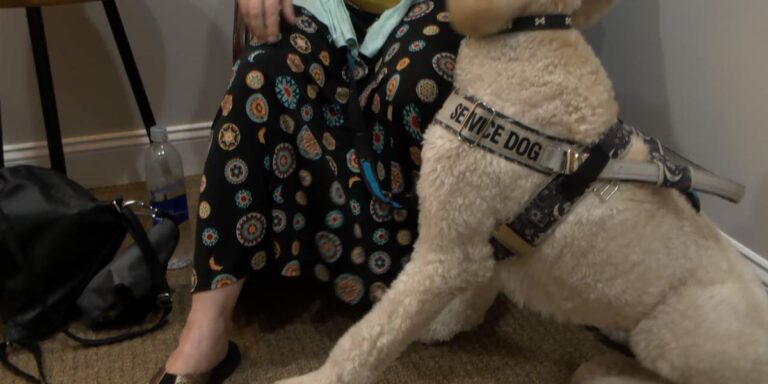WALTERBORO, S.C. (WCSC) – A woman claims a Walterboro restaurant discriminated against her and her family by refusing to seat her unless she could see identification for her service dog, claiming that her service dog was a pet.
Kelly Sanderson walked into El Pueblo restaurant in Walterboro last Friday with her husband, youngest son and service dog, only to be turned away by staff who asked for the dog’s identification.
Sanderson explained that the restaurant informed employees of what laws and regulations they could make requests or ask questions about, but the employees still refused service.
“My frustration with it was that they wouldn’t show me accurate, valid information,” Sanderson said.
South Carolina law allows service dogs to enter public facilities without an ID or jacket. There is no state or federal licensing system, and no special card identifying a dog as a “service dog.”
According to Disability Rights SC, to protect the privacy of people with disabilities, businesses can only ask two questions to people who come into the store with a service dog.
- Is this a service dog?
- What are you trained to do?
Sanderson said he told and answered those two questions to employees at El Pueblo, but they didn’t listen.
Sanderson’s psychiatric service dog, Galina, helps ease medical symptoms by providing deep pressure therapy, tactile stimulation and grounding.
“She’s not a pet. A service dog is like a medical device,” Sanderson said. “Sure, when I’m at home and I’m off work, she’s my dog, but when I go out somewhere, she’s not my pet. She’s working and she helps me get out and do things that I normally can’t do.”
A person who answered the phone at El Pueblo restaurant hung up three times when reached for comment Thursday.

When visited at the restaurant on Friday, El Pueblo management declined to comment.
In South Carolina, interfering with a service animal is a misdemeanor.
As emotional support animals have become more common, discussions surrounding the overuse and misinterpretation of service animals and emotional support animals have become a hot topic in recent years.
“My view is that a lot of people think they can take their dogs anywhere, but then we have people abusing the system and we as legitimate owners run into problems not being able to get to where they need to be,” Sanderson said.
South Carolina law says public accommodations do not have to allow emotional support animals indoors, even if their owners have a legal right to use them elsewhere, such as in their homes or workplaces.
There is also no legal right to bring an emotional support animal into a public accommodation.
“We believe businesses need to know the basics of ADA law,” Sanderson said. “They need to know what accommodations to make for employees, why and how, and they need to ensure they do so and that employees are aware of their rights.”
Copyright 2024 WCSC. All rights reserved.


